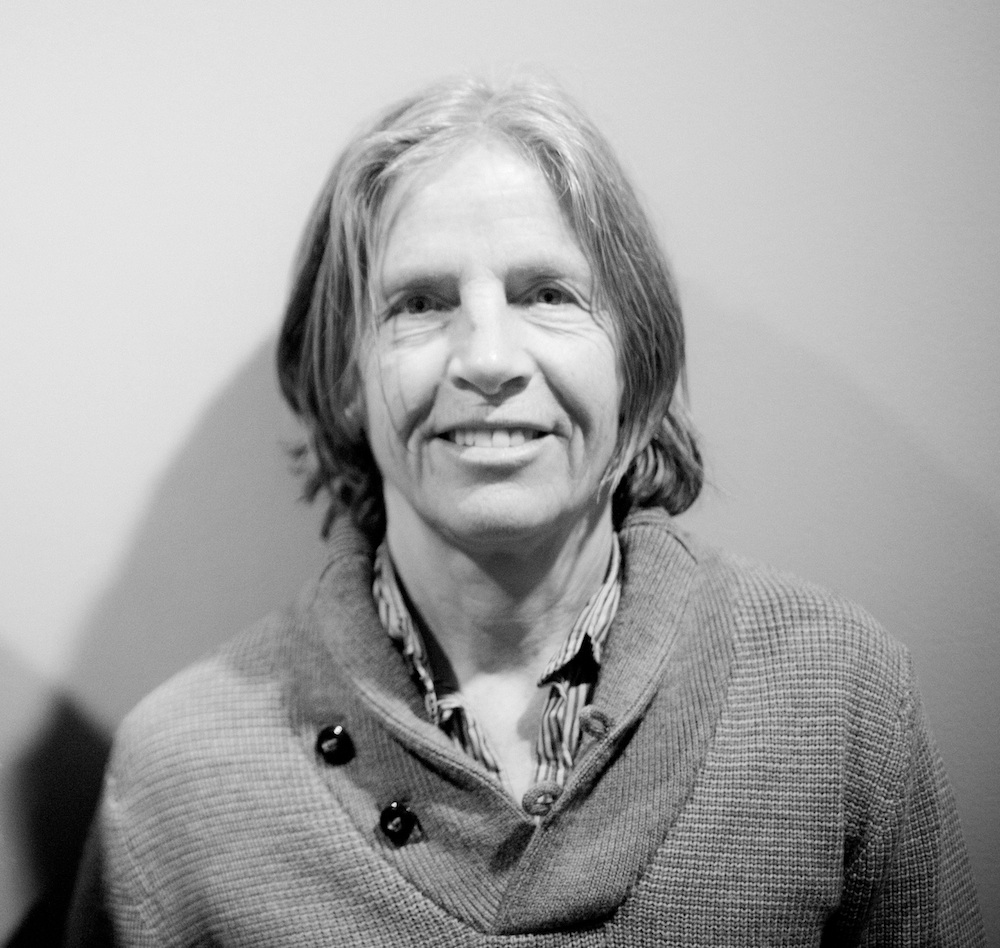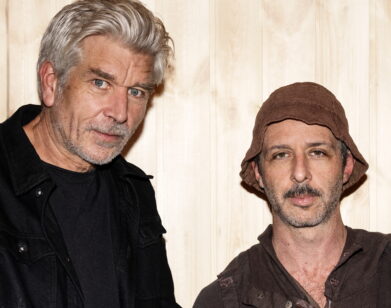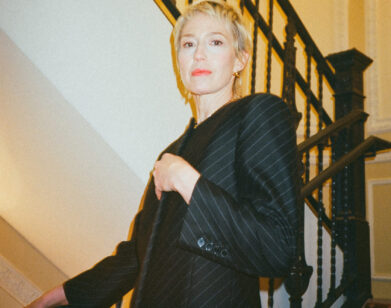The Life of Eileen Myles

ABOVE: EILEEN MYLES. PHOTO COURTESY OF LIBBY LEWIS.
Eileen Myles returned from Los Angeles on the night of the Super Blood Moon. She bikes down the street, past groups of people staring at the sky, and walks into Café Orlin. She’s quick to smile and still hasn’t dropped pieces of her Boston accent, even after 41 years living in New York City. Off the page, Myles isn’t much for small talk and is never afraid to go for the big idea. On the page, she’s the master of the tiny detail, a dogged and fearless categorizer of the personal and the political, and unapologetically sex- and fame-conscious. She is, in a word, a charmer.
Now in her mid-60s, Myles has published 20-something books. This week, the writer and poet is bringing out two more via Ecco Press: I Must Be Living Twice, which contains both new and selected poetry from her entire career, and her iconic autobiographical novel Chelsea Girls, which is being reissued after is original publication in 1994. “I had always figured if I had a book I’d want my face all over it,” she writes in Chelsea Girls. Now she has her wish twice-over.
MICHAEL HAFFORD: I love that you’re not shy about your ambition to be a famous writer. I feel like that’s one of the classic lies that writers tell: “I don’t want to be famous,” “I’m not in this for the fame.”
MYLES: Oh, I know. And yet, what is that act of saving words? That’s what it is all about. Since you were a child, there was a sense that writing is a kind of recording, and it’s recording something. I started keeping a diary when I was 10. I was doing something. It felt special. I had an intention. What does famous mean? Does it mean saint? Does it mean song? Something.
HAFFORD: You talked about becoming homeless when you came to New York. You gave everything to the city, in a way, and it’s given you your New York persona.
MYLES: Yeah. When I thought a lot in the ’90s about George Bush the Senior, I would say that part of what privilege was being comfortable everywhere. And anonymity, in a way, is the same thing—if you let go of your history and feel like none of it applies to the situation. The way they used to talk about photographic paper, paper that just receives impressions so easily and so wildly.
HAFFORD: Do you think that describes you, in a way?
MYLES: I think so. John Ashbery has this great phrase that I love to use: “Managed chance.” It’s not just chance, but it’s tweaking and becoming experience.
HAFFORD: You have to show up at the party.
MYLES: Yeah. You have to know which part of the thought you care about and what part to throw away. I feel like when I first was here I would let everything in—or as much as I could handle. As I’ve gotten more experienced and older, a lot gets tossed out and rearranged. That’s why I don’t call it memoir, because the rearrangement is the art.
HAFFORD: Well, Afterglow is a memoir about a dog.
MYLES: That’s sort of the joke, both because it’s not the dog talking and because it’s so much about having an animal as the fantasy about the animal. They don’t tell us who they are. I’ll never know who my dog was before I got her. She was on the street in the Bronx. She had a whole life.
HAFFORD: You could think that way about poetry or about writing. When you’re done with a piece, you don’t know about it. You don’t know if it’s good or not, you just know that it’s finished.
MYLES: It’s sort of none of your business. You take it to the point where it’s not yours anymore. It’s weird because, on some level, I write to make myself uncomfortable or to deal with my discomfort or my embarrassment. It feels like the editing is to somehow turn that into an object.
HAFFORD: In a lot of Chelsea Girls, you talk very explicitly about being uncomfortable. You bring cocaine to your own book party and everyone is shocked. And the writing is also unsure of itself—it’s constantly revising itself. Do you still feel uncomfortable in that same way?
MYLES: To the extent that I’m alive, I’m just sort of uncomfortable in a way. I’m better at managing it now, or I’m calmer. I’m worn down. In a good way—like an old leather jacket or something. It fits me, whatever it is.
HAFFORD: You moved here 41 years ago, lived here 20 years, wrote Chelsea Girls, lived here another 20 years, and are now bringing it back out.
MYLES: Really, 10 years. I wrote Chelsea Girls in my 30s. It was published in my 40s. I had written it all through the ’80s. I was learning how to write, writing that book. There’s one chapter, “Bread and Water,” that was literally like a copy of my life at that moment. I had a notebook or I had a typewriter out, “Now this is happening, now this is happening.”
HAFFORD: You talked about the vernacular a lot when you were interviewed for the Paris Review. Do you still feel in conversation with that version of yourself?
MYLES: Very much. She’s here. I am her; I was her. I know more. You see a video or hear a recording of yourself and there’s one thing: that’s the sound of the voice. The other thing is the stupid things you say. I remember being in my 30s and seeing a video of me being interviewed in my 20s, and it’s like, “Oh, she thinks she’s so cool.” So awkward. I still feel that way about different things.
HAFFORD: Like what?
MYLES: I think class is always an issue for me. I thought I’d become very sophisticated, or very sophisticated in my relationship to class. Then I’ll do something and think, “That’s so working class.” I’m sure this person is watching me and thinking, “Oh, Eileen.” I have a lot of doubling. That split seeing—where you’re being yourself and watching yourself. So that just rages on. I think I’ll always be that person. I’m more sophisticated in some ways. But where you came from and who you are and what your first impulses were… I think if you’re lucky you get to keep those things.
I MUST BE LIVING NOW AND CHELSEA GIRLS ARE OUT NOW VIA ECCO PRESS.






